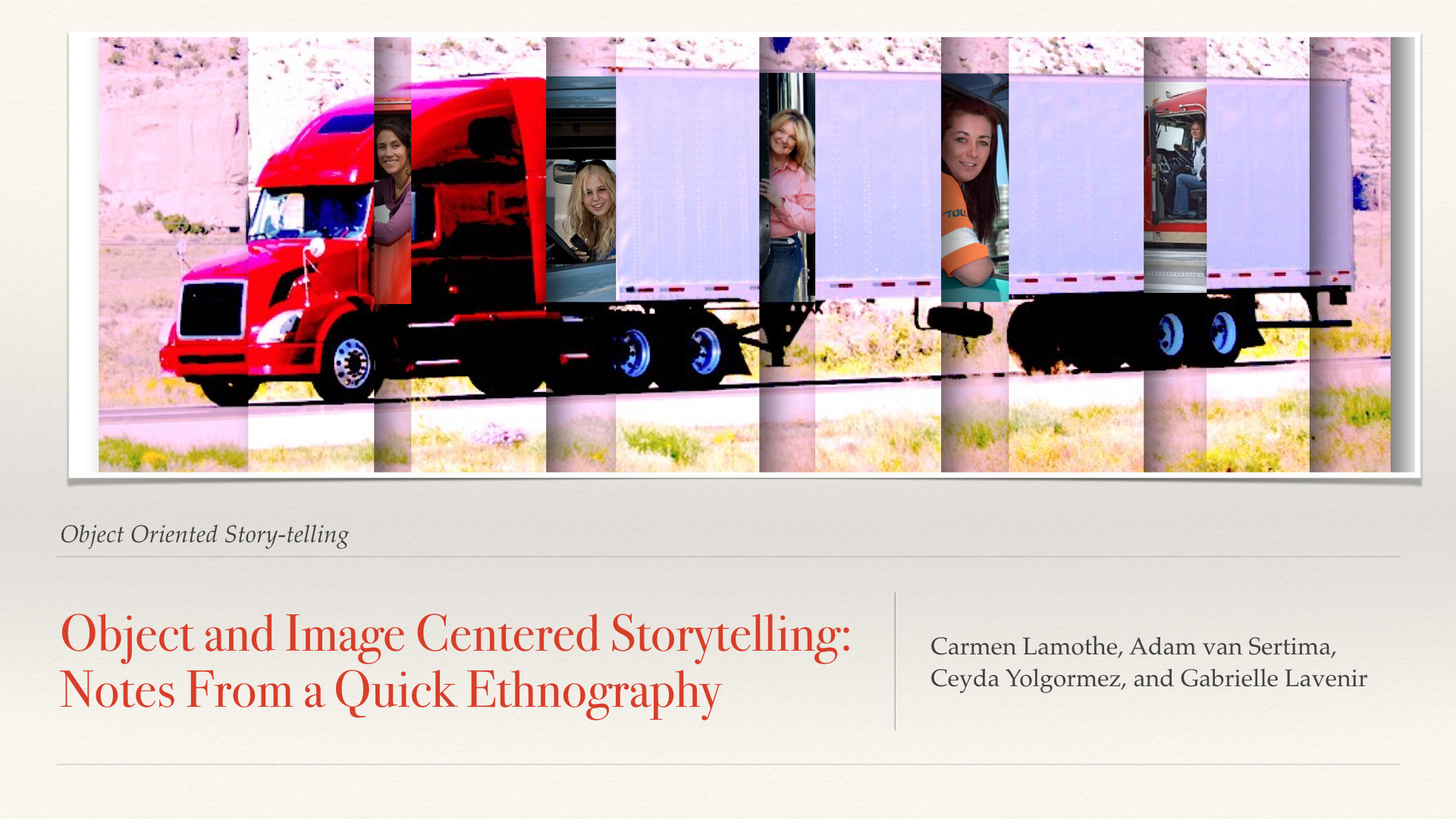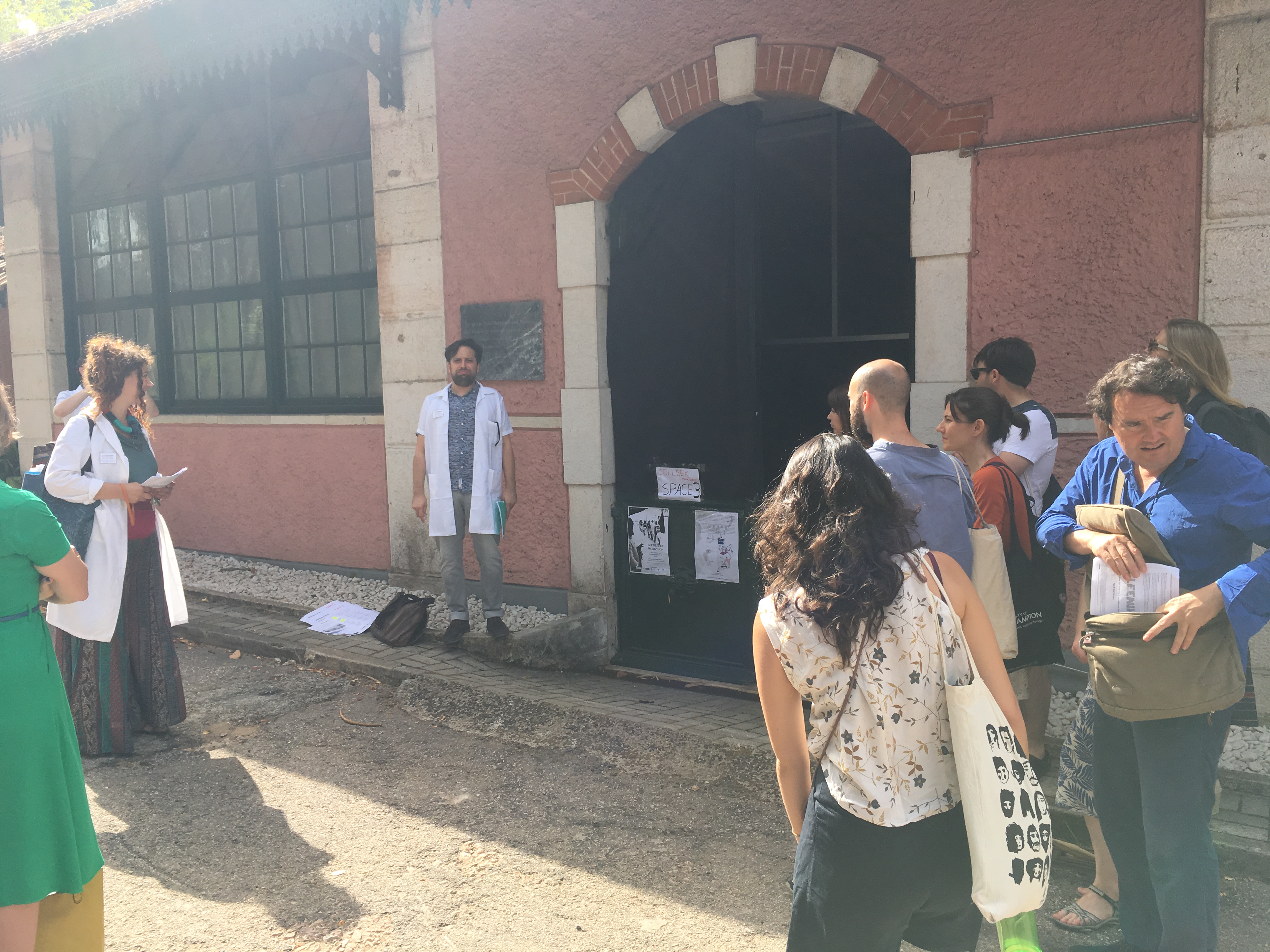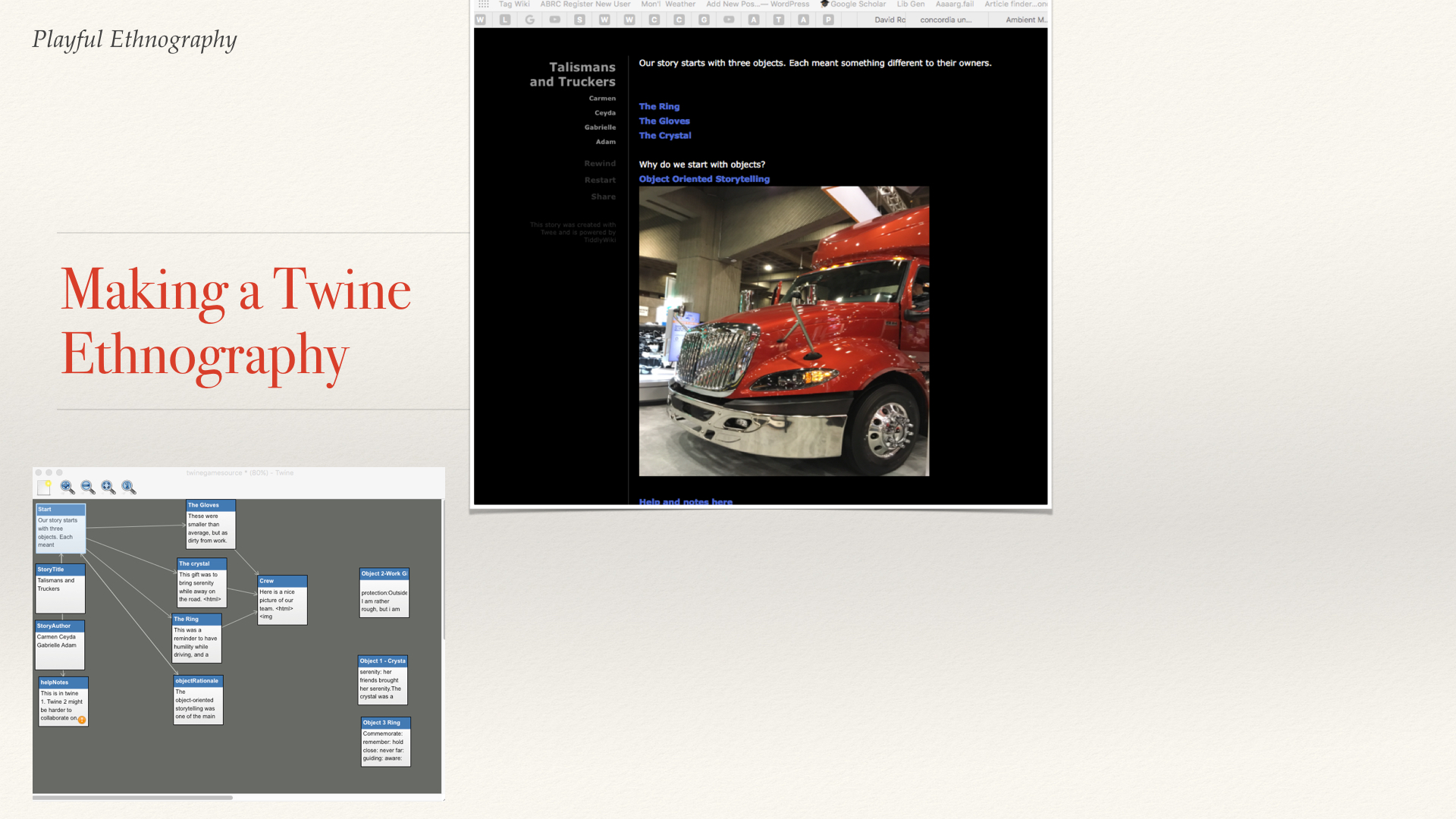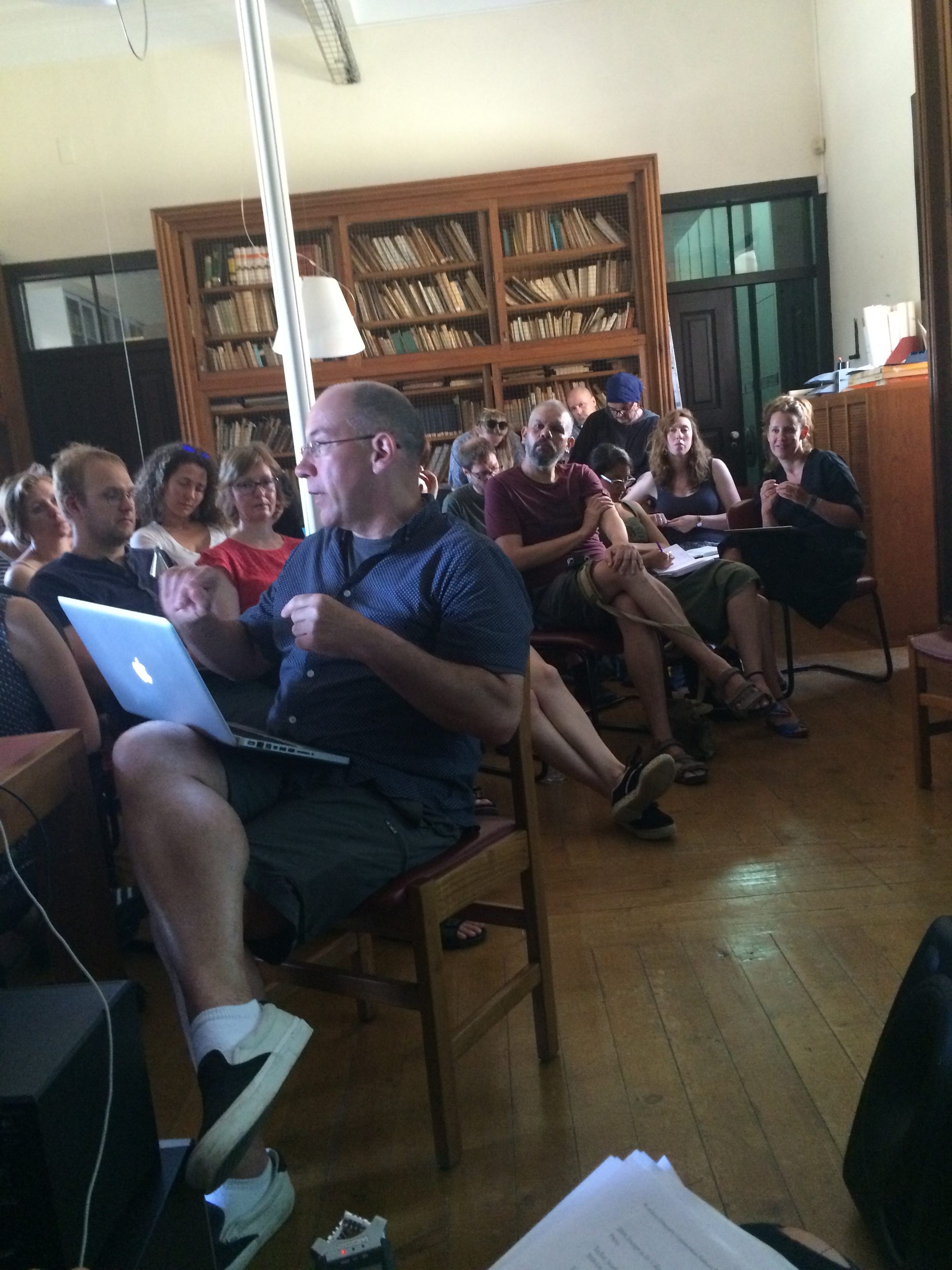 I gave two presentations last week in Lisbon, Portugal at the COLLEEX (pronounced COLL-EEGS) network workshop for experimental ethnography. One presentation was on behalf of our team researching women who drive long-haul trucks. That was done with Carmen Lamothe (M.A. soci). Sadly, two other tagsters, Ceyda Yolgormez and Gabrielle Lavenir couldn’t attend the event. Of particular interest tagsters would be our brief description of how we intend in presenting some of our research in the form of a Twine game. Prior to that I presented a paper on a workshop I lead building a table with other members of the Experimental Ethnography Lab, and the insights that arose in that process. The conference itself encouraged a very playful approach, and featured many workshops looking a different aspects of ethnographic research. The workshops were held at Lisbon’s Jardim Botanico Tropical rather than at an academic institution. This desire to escape the bounds of orthodox ethnography reflects the local sponsorship by the EBANO collective(Ethnography-Based Art Nomad Organisation), that aims to merge ethnographic with artistic practices. Together with Instituto de Ciências Sociais (ICS), Universidade de Lisboa, ethnographers were encouraged to present both research and engage in exploratory activities to think & re-think about the discipline. A key point that arose was when organiser Tomás Sánchez Criado coined the term, intra-vention, as opposed to intervention. This suggestion was a response to concern about the privileged position many ethnographers have when they attempt to produce ‘action-research’ in communities. I suspect this will start to appear rhetorically in future research as a result of this discussion.
I gave two presentations last week in Lisbon, Portugal at the COLLEEX (pronounced COLL-EEGS) network workshop for experimental ethnography. One presentation was on behalf of our team researching women who drive long-haul trucks. That was done with Carmen Lamothe (M.A. soci). Sadly, two other tagsters, Ceyda Yolgormez and Gabrielle Lavenir couldn’t attend the event. Of particular interest tagsters would be our brief description of how we intend in presenting some of our research in the form of a Twine game. Prior to that I presented a paper on a workshop I lead building a table with other members of the Experimental Ethnography Lab, and the insights that arose in that process. The conference itself encouraged a very playful approach, and featured many workshops looking a different aspects of ethnographic research. The workshops were held at Lisbon’s Jardim Botanico Tropical rather than at an academic institution. This desire to escape the bounds of orthodox ethnography reflects the local sponsorship by the EBANO collective(Ethnography-Based Art Nomad Organisation), that aims to merge ethnographic with artistic practices. Together with Instituto de Ciências Sociais (ICS), Universidade de Lisboa, ethnographers were encouraged to present both research and engage in exploratory activities to think & re-think about the discipline. A key point that arose was when organiser Tomás Sánchez Criado coined the term, intra-vention, as opposed to intervention. This suggestion was a response to concern about the privileged position many ethnographers have when they attempt to produce ‘action-research’ in communities. I suspect this will start to appear rhetorically in future research as a result of this discussion.

CLEENIK- Common syndromes of ethnographic experimentation with COLLEEX organisers(in dr’s smocks) Francesca De Luca, ICS, ULisboa & Tomás Sánchez Criado, MCTS, TU Munich
The workshop started off playfully with the organisers dressed in doctor’s smocks. After a brief introduction, the seventy-odd attendees divided into groups and began to list their symptoms of pathological ethnography(CLEENIK). The form included symptomologies of “Goingnativitis”, EES (Excess Engagement Stress) and TRIAD(TRansdisciplinary Interdisciplinary Associative Disorder). We were encouraged to write down those parts of what troubled us as ethnographers. We then handed them of to another attendee who would diagnose us, then handed to a third who would suggest treatment. This playfulness was encouraged through out the three-day workshop.
 Our presentation outlined the field work we had performed over the previous seven months. We mentioned that we were developing a twine game. In its current interation, we let objects chosen by our participants act as protagonists. As our methods focussed on what we called ‘Object Oriented story-telling, we described how these objects were chosen by our participants because these objects had special meaning to them in their lives as truckers. We also developed a writing process to go from our participant interviews(Three women who drive 18-Wheel trucks) to a letting objects in their lives ‘speak’. We borrowed from magical realist writers such as Tim Robbins for inspiration. This playful, phanticist approach has justification in the work of Clifford Geertz, who writes that all ethnographic writing is fictio, meaning ‘made’ and always stands two or three degrees away from its object.
Our presentation outlined the field work we had performed over the previous seven months. We mentioned that we were developing a twine game. In its current interation, we let objects chosen by our participants act as protagonists. As our methods focussed on what we called ‘Object Oriented story-telling, we described how these objects were chosen by our participants because these objects had special meaning to them in their lives as truckers. We also developed a writing process to go from our participant interviews(Three women who drive 18-Wheel trucks) to a letting objects in their lives ‘speak’. We borrowed from magical realist writers such as Tim Robbins for inspiration. This playful, phanticist approach has justification in the work of Clifford Geertz, who writes that all ethnographic writing is fictio, meaning ‘made’ and always stands two or three degrees away from its object.
COLLEEX are an official network of European Association of Social Anthropologists (EASA). They are looking towards innovative, collaborative approaches to doing ethnography. They, and the EBANO Collective are interested in broadening their reach for collaborations. I think that it would be worth attending their future events because of their commitment to challenging orthodoxies within and without anthropology and ethnography.

